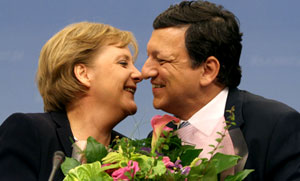A new Renaissance for Europe

In his remarks on the report, Barroso writes that it “highlights some challenges and the immense opportunities that science, engineering and technology may bring us over the next 15 years. It also suggests how decision-makers and citizens can start preparing for the future and more importantly, how we can create our own future.”
Against a ‘knowledge divide’
In ‘The Future of Europe is Science’ three main ‘foresight activities’ to prepare policy-makers for a future in which the must “anticipate potential opportunities as well as threats and manage risks prudently and effectively.”
These three are:
? providing equal opportunities with respect to education, basic social services, access to technologies and services (including digital equality), and political participation;
? developing and implementing effective and efficient procedures for peaceful conflict resolution, financial stability, fair burden sharing and distribution of wealth;
? reducing environmental pollution, unsustainable land use and resource depletion to a minimum.
The STAC-report urges that “Europe needs to ensure that transitions and technological opportunities will be equally accessible to all its citizens. Knowledge, in particular, will be an increasingly valuable commodity: a knowledge divide in society could have severe consequences.”
In stimulating knowledge as a ‘commodity’ a new Renaissance is required, the report concludes. “It is inconceivable that this vision can be reached without science, engineering and technology (SET) as a central element. The future of Europe is science.”
The full report can be read here
Meest Gelezen
‘Free riding brengt het hoger onderwijs in de problemen’
Vrouwen houden universiteit draaiende, maar krijgen daarvoor geen waardering
Hbo-docent wil wel rolmodel zijn, maar niet eigen moreel kompas opdringen
‘Sluijsmans et al. slaan de plank volledig mis’
Aangepast wetsvoorstel internationalisering dient vooral samenleving in plaats van student

